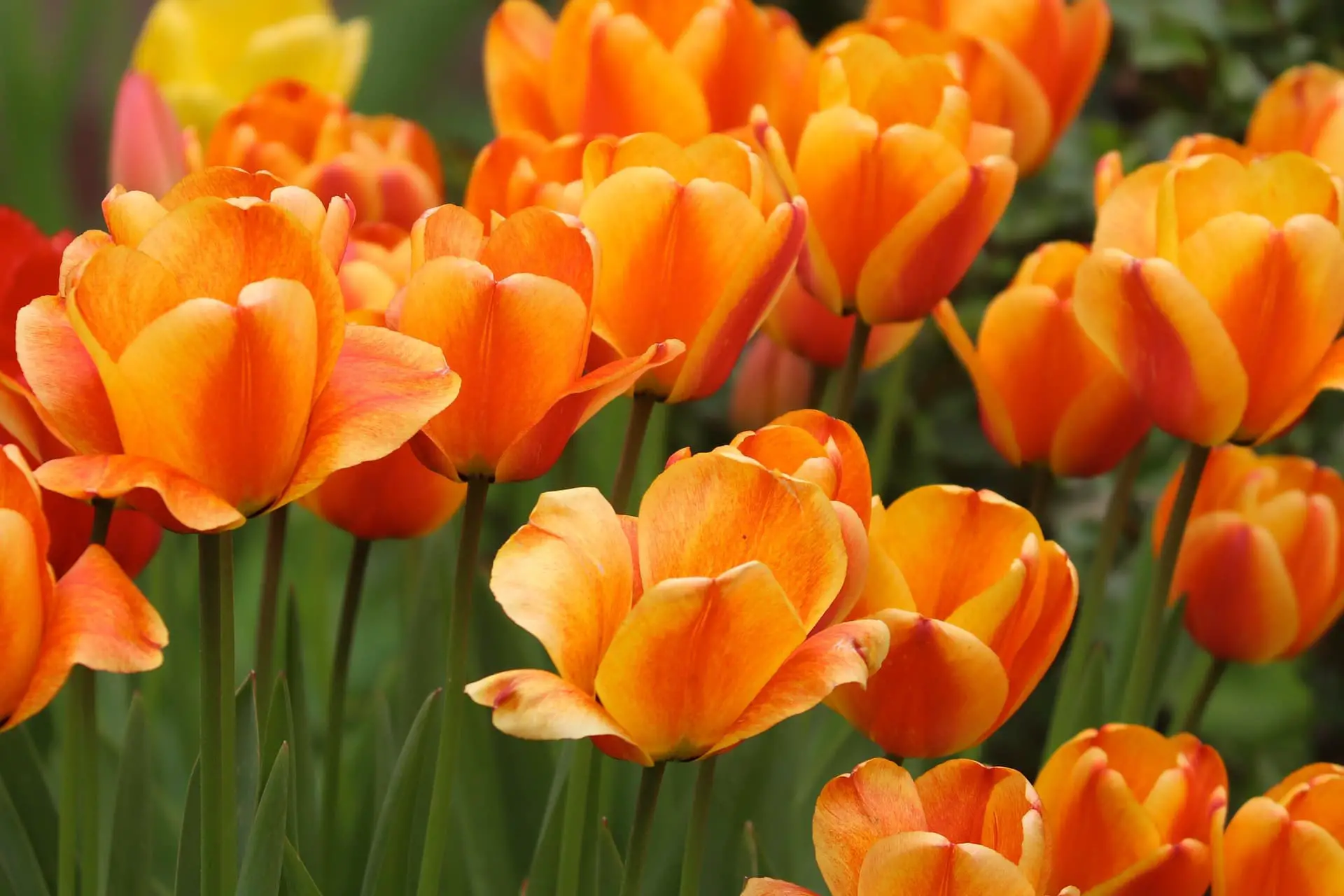Tulips have a long and rich history, and their symbolism and meaning have changed over the years. Although tulips on their own are associated with certain things, but their color also can symbolize different things.
Orange tulips carry a diverse range of symbolic meanings. They are often associated with forbidden or hidden love, representing a passionate and intense affection that may be concealed or unacknowledged. Orange tulips also symbolize originality, expressing the uniqueness and individuality of the recipient. Additionally, they are seen as a harbinger of good luck and wealth, symbolizing abundance and prosperity. These vibrant blooms are also linked to fertility, success, and achievement, making them a suitable gift to celebrate new beginnings, such as the birth of a child.
If you want to gift somebody orange tulips, then my personal recommendation is to get them a crystal vase as well, the flowers will fade but a crystal vase is forever Click here to check it out on Amazon.com
Orange tulips are one of the most popular colors of tulips, not because of their symbolism but because of their vibrant colors. Orange tulips are not found in the wild, because they have been selectively bred until their flowers became orange. Hundreds of years ago around the 17th century, the Dutch cross bred different colored tulips, and the orange ones were a result of cross breeding yellow and red tulips.
Orange tulips are strongly associated with positive vibes and happy thoughts, and they make an ideal gift if you want to cheer up somebody. If you want to know the meaning of purple tulips then check out my recent article Purple Tulips Meaning ( Secret Meanings & Symbolism ).
Orange Tulips Meaning
Orange tulips symbolize energy, enthusiasm, and warmth. The vibrant and fiery color of orange is often associated with excitement, passion, and optimism, making orange tulips a representation of these qualities. They convey a sense of joy and enthusiasm, making them a great choice for uplifting and cheerful occasions. Orange tulips also symbolize friendship and kinship, making them a meaningful gift to celebrate a close bond or express gratitude to a friend. Additionally, orange tulips can convey a sense of adventure and creativity, making them a perfect choice for encouraging inspiration or embarking on new endeavors.
Earn a 50% Commission on each sale by simply sharing my guides with friends and family on social media, check out Flower Duty Affiliates
Orange Tulips Symbolism
The most commonly associated symbolism of orange tulips is warmth, happiness, and enthusiasm. Yellow and orange tulips have very similar symbolism, and in some cultures, they have the same meaning. Most of the symbolism of orange tulips is due to their vibrant colors, especially as orange tends to be a fairly rare color when it comes to flowers.
Warmth: The warmth symbolism of orange tulips is because almost everything that is orange tends to be warm, like a fire, the sun, and so on.
Happiness: The happiness symbolism of orange tulips is because these flowers will put a smile on anybody who gets them as a gift, this is the same symbolism for yellow tulips as well.
Enthusiasm: The orange color is strongly associated with energy and in orange tulips, it could mean enthusiasm, excitement, and passion.
Positive Vibes: This symbolism of orange tulips is because overall orange tulips do symbolize only positive things.
Orange Tulips Through History
Orange tulips are relatively new when compared to other colors like red, white, and yellow. Red, white, and yellow tulips do grow in their natural habitat, but the orange ones were cross bred by the Dutch.
The Dutch were the first ones to cultivate tulips in Europe, and they quickly started cross breeding them to get new varieties of tulips, both in shape and color. During the Dutch Tulip Mania, a single tulip bulb was worth more than gold, and orange tulips were even more expensive due to their rarity.
Tulips are native to Central Asia, and in this part of the world, they have been cultivated for thousands of years. The Persians were the first to cultivate tulips, followed by the Ottoman Empire, and later by the Dutch who are still famous for their beautiful tulips. If you want to know the meaning of yellow tulips then check out my recent article Yellow Tulips Meaning ( Symbolism & Secret Meanings ).
Orange Tulips In Different Cultures
Orange tulips have been associated by the Dutch to the House of Orange, which was the ruling family at the time. The Dutch were the first ones to cultivate orange tulips on a large scale, mostly because they were the ones that developed orange tulips.
In the USA, orange tulips have some extra symbolism around them like optimism and positivity. Orange flowers are usually used in bouquets with other colors of tulips, especially for happy events like weddings and birthdays.
In Iran orange tulips have a special place, mostly because tulips have been cultivated in the area for thousands of years, back when Iran was actually called Persia. Orange tulips today in Iran are a symbol of new beginnings, often used at spring festivals.
In Chines culture, orange tulips are not that common, although they do symbolize energy and enthusiasm. Generally speaking tulips in Chinese culture symbolize beauty and elegance, although different colors of tulips do have their own meanings. If you want to know what pink tulips mean then check out my recent article Pink Tulips Meaning ( Symbolism & Secret Meanings ).
Key Takeaways
- Orange Tulips mean excitement, energy, warmth, happiness, positive vibes, and enthusiasm. The main reason why orange tulips have been strongly associated with happiness and warmth is due to their vibrant colors. If somebody has gifted you orange tulips then they want to tell you that they are happy either with you or for you, or they want to cheer you up.
- Orange tulips are excellent gifts for happy occasions like weddings, birthdays, or even for getting a promotion.
- Orange tulips do not symbolize romantic feelings, even if they do symbolize happiness.

